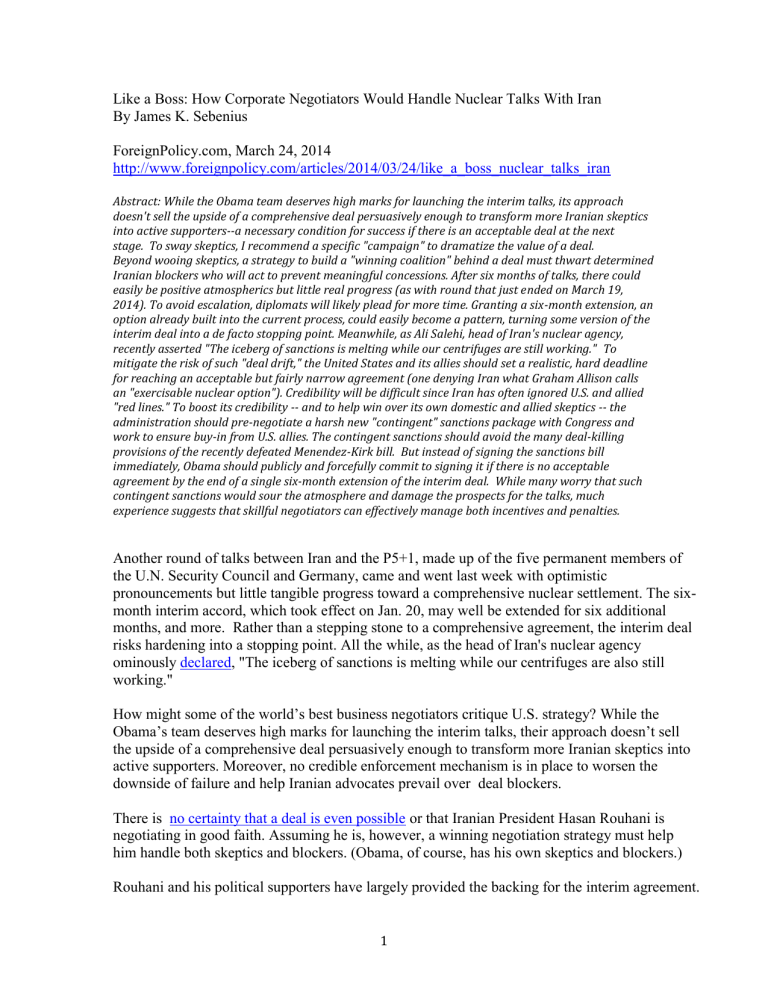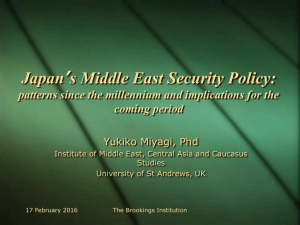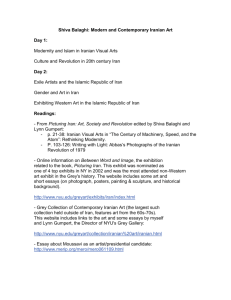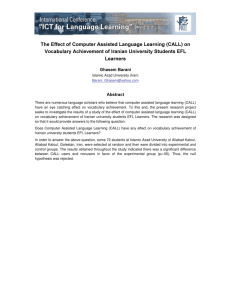Like a Boss: How Corporate Negotiators Would Handle Nuclear Talks... By James K. Sebenius ForeignPolicy.com, March 24, 2014

Like a Boss: How Corporate Negotiators Would Handle Nuclear Talks With Iran
By James K. Sebenius
ForeignPolicy.com, March 24, 2014 http://www.foreignpolicy.com/articles/2014/03/24/like_a_boss_nuclear_talks_iran
Abstract: While the Obama team deserves high marks for launching the interim talks, its approach doesn't sell the upside of a comprehensive deal persuasively enough to transform more Iranian skeptics into active supporters--a necessary condition for success if there is an acceptable deal at the next stage. To sway skeptics, I recommend a specific "campaign" to dramatize the value of a deal.
Beyond wooing skeptics, a strategy to build a "winning coalition" behind a deal must thwart determined
Iranian blockers who will act to prevent meaningful concessions. After six months of talks, there could easily be positive atmospherics but little real progress (as with round that just ended on March 19,
2014). To avoid escalation, diplomats will likely plead for more time. Granting a six-month extension, an option already built into the current process, could easily become a pattern, turning some version of the interim deal into a de facto stopping point. Meanwhile, as Ali Salehi, head of Iran's nuclear agency, recently asserted "The iceberg of sanctions is melting while our centrifuges are still working." To mitigate the risk of such "deal drift," the United States and its allies should set a realistic, hard deadline for reaching an acceptable but fairly narrow agreement (one denying Iran what Graham Allison calls an "exercisable nuclear option"). Credibility will be difficult since Iran has often ignored U.S. and allied
"red lines." To boost its credibility -- and to help win over its own domestic and allied skeptics -- the administration should pre-negotiate a harsh new "contingent" sanctions package with Congress and work to ensure buy-in from U.S. allies. The contingent sanctions should avoid the many deal-killing provisions of the recently defeated Menendez-Kirk bill. But instead of signing the sanctions bill immediately, Obama should publicly and forcefully commit to signing it if there is no acceptable agreement by the end of a single six-month extension of the interim deal. While many worry that such contingent sanctions would sour the atmosphere and damage the prospects for the talks, much experience suggests that skillful negotiators can effectively manage both incentives and penalties.
Another round of talks between Iran and the P5+1, made up of the five permanent members of the U.N. Security Council and Germany, came and went last week with optimistic pronouncements but little tangible progress toward a comprehensive nuclear settlement. The sixmonth interim accord, which took effect on Jan. 20, may well be extended for six additional months, and more. Rather than a stepping stone to a comprehensive agreement, the interim deal risks hardening into a stopping point. All the while, as the head of Iran's nuclear agency ominously declared , "The iceberg of sanctions is melting while our centrifuges are also still working."
How might some of the world’s best business negotiators critique U.S. strategy? While the
Obama’s team deserves high marks for launching the interim talks, their approach doesn’t sell the upside of a comprehensive deal persuasively enough to transform more Iranian skeptics into active supporters. Moreover, no credible enforcement mechanism is in place to worsen the downside of failure and help Iranian advocates prevail over deal blockers.
There is no certainty that a deal is even possible or that Iranian President Hasan Rouhani is negotiating in good faith. Assuming he is, however, a winning negotiation strategy must help him handle both skeptics and blockers. (Obama, of course, has his own skeptics and blockers.)
Rouhani and his political supporters have largely provided the backing for the interim agreement.
1
By themselves, however, they cannot provide sufficient support for a fuller deal. To succeed, they must attract part of a larger group of what you might term “persuadable skeptics” -- tired of isolation and Ahmadinejad-induced confrontation, hoping for an economic upturn, but suspicious of the P5+1 -- who are at least open to a more comprehensive deal that offers real benefits relative to a costly impasse.
“Deal blockers” are unconditional opponents who sought to prevent the interim deal and will fight virtually any larger accord, in part by recruiting allies from the ranks of deal skeptics. Much of the Revolutionary Guard and many conservative clerics -- already staging a rearguard action against the interim deal -- want to put a stop to Rouhani and his allies. If Iran’s Supreme Leader,
Ayatollah Ali Khamenei, ends up firmly in this group, he would serve as a one-man blocking coalition, and no deal would be possible. The more skeptics Rouhani can win over, however, the less likely this is to happen.
Facing these factional cross-currents, the United States and the P5+1 should address both groups separately. First, they should target skeptics with a persuasive campaign for agreement. Second, they should try to thwart blockers, whose activities may lead to indefinite extensions of the interim agreement, by means of a hard deadline with teeth.
For 34 years with no official communication between the two capitals, hardliners in Tehran have portrayed the United States and its allies as implacable, interested only in sanctions and threats. As a result, skeptics and blockers easily sow doubt that the U.S.-led coalition would ever deliver meaningful benefits as part of a nuclear deal.
To counter this hostile narrative, the United States should orchestrate a far more persuasive campaign that targets potentially persuadable Iranian skeptics, helping to build the largest possible constituency for a deal. The current interim deal offers modest sanctions relief, doled out in carefully calibrated increments. But U.S. negotiators should do more to emphasize the much larger potential benefits that would accrue to Iran with -- but only with -- a larger deal.
For example, during the next round of nuclear talks, scheduled for April, the P5+1 should encourage international oil companies and other businesses to send well-publicized missions to
Iran to demonstrate advanced technology and investment willingness. Similar efforts could be made to highlight the potential benefits of increased commerce, finance, and access to the
Western agriculture, civil aviation, and telecommunication sectors. U.S. and European scientific teams could likewise be dispatched to explore potential cooperation with Iranian scientists in non-nuclear fields.
For the most part, the Obama administration has opposed such initiatives -- notably by French and German companies -- concerned that they would weaken the sanctions regime (in a notable exception, the administration authorized U.S. academic exchanges with Iranian universities on
March 19.) But a coordinated campaign for Western companies and scientists to more visibly tout their wares could potently counter the hardline Tehran narrative, demonstrating that, given a deal, no Western agenda exists to frustrate Iran’s scientific progress or economic development. Targeting skeptics in this way would help mobilize potential supporters and isolate hardliners. It would also help persuade allies that the United States is serious about diplomacy,
2
something that will be important if negotiations fail and allied support is needed for tougher measures.
Such a campaign need not undermine the sanctions regime. Without a final nuclear deal, none of these tantalizing benefits for Iran would be realized. In Obama’s words , governments could still come down “like a ton of bricks” on sanctions violators.
In addition to wooing skeptics, a winning strategy must thwart determined Iranian blockers who seek a nuclear capability and will try to prevent meaningful concessions. After six months of talks there could easily be positive atmospherics but little real progress (as with the talks that just ended.) Eager to avoid escalation, the P5+1 and Iranian diplomats could conceivably plead for more time. This possibility has led to predictions of a likely six-month extension of the negotiations -- an option that’s already built into the interim deal. This could easily become a pattern, turning some version of the interim deal into a de facto stopping point. Meanwhile,
Western companies continue to lobby their governments to permit Iranian contracts, the will of allies to support sanctions erodes, diplomatic focus shifts, and Iran’s nuclear program quietly advances.
To mitigate this very real risk of deal drift, the United States and its allies should set a realistic, hard deadline for reaching an acceptable agreement. Setting a credible deadline will be difficult, however, since warnings of “red lines” will doubtlessly ring hollow to an Iranian regime that has already crossed so many .
To boost its credibility -- and to help win over its own domestic and allied skeptics -- the administration should pre-negotiate a harsh new “contingency” sanctions package with Congress and work to ensure buy-in from U.S. allies. But instead of signing the sanctions bill immediately,
Obama should -- at an appropriate pause point in the ongoing talks -- publicly and forcefully commit to signing it if there is no acceptable agreement by the end of one, six-month extension of the interim deal. A contingent sanctions bill passed with deep bipartisan support, coupled with a public presidential commitment to sign it by a specific date, will enhance U.S. credibility, highlight the very real downsides for Iran of no deal, and make it harder for blockers to gain traction in Tehran.
The Obama administration wisely opposed a recent sanctions bill sponsored by Sen. Robert
Menendez (D-N.J.) and Sen. Mark Kirk (R-I.L.) that went well beyond nuclear issues and included provisions that would have killed a final deal with Iran. (See here and here for specifics.) By contrast, this new contingent sanctions legislation should focus narrowly on the all-important nuclear file. For years to come, the United States and its allies will be dealing with issues like Iran’s human rights record, support for Bashar al-Assad’s regime in Syria, and collaboration with the Shiite militant group Hezbollah in Lebanon -- but doing so will be far more effective if Iran has no nukes.
Unlike the Menendez-Kirk bill, the contingency legislation should not hamper diplomatic creativity with requirements that are overly detailed or specific. Instead, it should establish one clear criterion: To avoid harsher sanctions, a new deal must verifiably prevent Iran from developing what Harvard political scientist Graham Allison characterizes as an “ exercisable
3
nuclear option
.”
To avoid triggering the new sanctions, Obama would have to certify that any new deal meets this criterion; a bipartisan expert panel of former national security officials could also be required to concur. The International Atomic Energy Agency, meanwhile, could be required to declare that
Iran has satisfactorily answered all of its questions.
Designed properly, such certifications -- coupled with the administration’s likely unexpected decision to work proactively with Congress on contingent sanctions -- would help reassure U.S. and allied skeptics, who worry that the administration is too soft. (Indeed, after the administration and its allies defeated the Menendez-Kirk bill, 83 Senators and 394 House members wrote the administration urging tough conditions for any nuclear deal.)
Some fret that setting a specific deadline with sharp teeth would sour the negotiating atmosphere.
Iran will surely protest and may even walk out of the negotiations temporarily. Yet if strong, public threats will kill negotiations, the Obama administration would have already blown it. For example, Obama recently threatened
, “I’ll work with members of Congress to put even more pressure on Iran … if negotiations fail, even new and harsher sanctions will be put into place.”
The real problem is not atmosphere-jeopardizing threats; it is is their credibility coupled with the lack of any forcing mechanism such as a specific deadline.
Combined with a positive campaign that makes the gains of a deal more apparent, setting a hard deadline could well tip the internal Iranian balance in favor of a deal. After all, as savvy business and financial dealmakers know from long experience, bargaining in the shadow of a lawsuit, strike or hostile takeover often spurs results that would not have been possible without the credible threat of consequences stemming from failure. A deadline with contingent sanctions would amount to a milder version of Richard Holbrooke’s “bomb and talk” approach to ending the Bosnian war.
Remember, the campaign to win over Iranian skeptics and forestall the blockers is not about capitulation and humiliation. Rather it highlights valuable mutual gains to be had if Iran finally verifies the peaceful nature of its nuclear program -- something the regime has long affirmed, along with its religiously based opposition to obtaining nuclear weapons. But if Iran continues to stall while its centrifuges spin, a hard deadline with sharp teeth awaits.
James K. Sebenius is a professor at Harvard Business School and director of the Harvard
Negotiation Project. The argument in the fairly short FP article is a condensed portion of a much larger analysis that can be found in the an HBS working paper, downloadable here: http://www.hbs.edu/faculty/Pages/item.aspx?num=46180.
4






